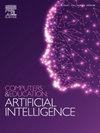Artificial intelligence in teaching and teacher professional development: A systematic review
Q1 Social Sciences
Computers and Education Artificial Intelligence
Pub Date : 2024-12-23
DOI:10.1016/j.caeai.2024.100355
引用次数: 0
Abstract
The application of Artificial Intelligence (AI) technology in education is increasingly recognized as a key driver of educational innovation. While extensive literature exists on the integration of AI technologies in educational settings, less emphasis has been placed on the critical role of teachers and their professional development needs. This study systematically reviews research conducted between 2015 and 2024 on teachers' use of AI technology in their teaching and professional development, focusing on the relationship between the supply of professional development opportunities and the demand for AI integration among teachers. Using PRISMA principles and protocols, this review identified and synthesized 95 relevant research articles. The findings reveal a significant imbalance in research focus. Specifically, 65% of the studies examined the application of AI in teaching, including technologies such as conversational AI and related technologies, AI-driven learning and assessment systems, immersive technologies, visual and auditory computing, and teaching and learning analytics. In contrast, only 35% of the studies explored AI's role in enhancing teacher professional development. This review highlights a gap in research addressing the development needs of teachers as they integrate AI technologies into their teaching practices. It emphasizes the need for future research to focus more on the potential of AI in teacher professional development and to investigate how AI technologies can be applied in education from both the perspectives of student learning and teacher instruction. Furthermore, research on AI in professional development should prioritize addressing technological and ethical challenges to ensure the responsible and effective integration of AI in education.
求助全文
约1分钟内获得全文
求助全文
来源期刊

Computers and Education Artificial Intelligence
Social Sciences-Education
CiteScore
16.80
自引率
0.00%
发文量
66
审稿时长
50 days
 求助内容:
求助内容: 应助结果提醒方式:
应助结果提醒方式:


